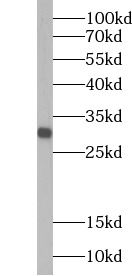Products
MMP7 antibody
Category:
Research Area:
| Synonyms: | Matrilysin antibody, Matrin antibody, Matrix metalloproteinase 7 antibody, MMP 7 antibody, MMP7 antibody, MPSL1 antibody, PUMP 1 antibody, Pump 1 protease antibody, PUMP1 antibody, Uterine metalloproteinase antibody | ||
| Catalogue No.: | FNab05245 | Reactivity: | Human, Mouse, Rat |
| Host: | Rabbit | Tested Application: | ELISA, WB, IHC |
| Clonality: | polyclonal | Isotype: | IgG |
- SPECIFICATIONS
- Product Name
- MMP7 antibody
- Catalogue No.
- FNab05245
- Size
- 100μg
- Form
- liquid
- Purification
- Immunogen affinity purified
- Purity
- ≥95% as determined by SDS-PAGE
- Clonality
- polyclonal
- Isotype
- IgG
- Storage
- PBS with 0.02% sodium azide and 50% glycerol pH 7.3, -20℃ for 12 months (Avoid repeated freeze / thaw cycles.)
Immunogen
- Immunogen
- matrix metallopeptidase 7 (matrilysin, uterine)
- Alternative Names
- Matrilysin antibody, Matrin antibody, Matrix metalloproteinase 7 antibody, MMP 7 antibody, MMP7 antibody, MPSL1 antibody, PUMP 1 antibody, Pump 1 protease antibody, PUMP1 antibody, Uterine metalloproteinase antibody
- UniProt ID
- P09237
- Observed MW
- 30 kDa
Application
- Tested Applications
- ELISA, WB, IHC
- Recommended dilution
- WB: 1:500 - 1:2000; IHC: 1:50 - 1:200
Validated Images
 NIH/3T3 cells were subjected to SDS PAGE followed by western blot with FNab05245(MMP7 antibody) at dilution of 1:1000
NIH/3T3 cells were subjected to SDS PAGE followed by western blot with FNab05245(MMP7 antibody) at dilution of 1:1000
 Immunohistochemistry of paraffin-embedded human pancreas cancer using FNab05245(MMP7 antibody) at dilution of 1:100
Immunohistochemistry of paraffin-embedded human pancreas cancer using FNab05245(MMP7 antibody) at dilution of 1:100
- Background
- This gene encodes a member of the peptidase M10 family of matrix metalloproteinases (MMPs). Proteins in this family are involved in the breakdown of extracellular matrix in normal physiological processes, such as embryonic development, reproduction, and tissue remodeling, as well as in disease processes, such as arthritis and metastasis. The encoded preproprotein is proteolytically processed to generate the mature protease. This secreted protease breaks down proteoglycans, fibronectin, elastin and casein and differs from most MMP family members in that it lacks a conserved C-terminal hemopexin domain. The enzyme is involved in wound healing, and studies in mice suggest that it regulates the activity of defensins in intestinal mucosa. The gene is part of a cluster of MMP genes on chromosome 11. This gene exhibits elevated expression levels in multiple human cancers.



